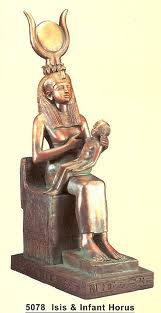NabloPoMo Post #18
Isis - the mysterious Egyptian goddess with origins in ancient Greece whose influence lasted well into the Roman era and further. Who is she and what has made the cult of Isis so enduring?
In the Egyptian mythology, Isis, was the daughter of Geb, the god of the Earth and Nut, the goddess of Sky. She was the mother of god Horus, and the sister and wife of Osiris. Her love and devotion for her husband was such that she risked her own life to bring him back to life when he was killed by Set. The legend is that after Set (also a brother to her and Osiris) murdered Osiris, he scattered his body parts so that he couldn't be brought back. However, Isis found all the pieces but one - the phallus, which was swallowed by a fish - and was able to put Osiris back together and made him a new phallus with magic.This is one of the original stories of the magical resurrection. Magic played a large role in the story, as Isis needed to learn magic in order to resurrect her husband. The myth tells of Ra having the necessary magic but refusing to teach it to Isis until she tricks him into revealing his secret name (she makes a snake bite him while she's the only one who can give him the cure for the bite). This is only one version of the Isis legend. She was later also associated with the god Ra and the god Hathor.
It is interesting to note that the concept of learning a deity's name, or "secret name", giving one power over the said deity, goes through many religions, including Judaism.
When Egypt was conquered by Alexander the Great of Greece and later by the Roman Empire, the cult of Isis spread like wildfire through Greco-Roman region.
With the advance of the early Christianity, the worship of Isis did not disappear completely. In fact, it was incorporated in many places into the Christian worship, as not plausible as that may sound. Many early statues of Mary, mother of Jesus were very similar to the status of Isis.
Isis was known by many names and was the patron goddess of mothers and wives, as well as the goddess of nature and magic. In the Book of the Dead, she is known as “she who gives birth to heaven and earth, knows the orphan, knows the widow, and seeks justice for the poor and shelter for the weak” (Wikipedia: Isis)
What is it that makes Isis so important and endearing to so many peoples and centuries? Her story is the story of spousal and maternal love - themes that are as enduring as time itself. Being the patron of women and nature, she was the one women turned to for protection and understanding of their needs. The role that was later carried on by Mary. Her story appeals to romantics, adventurers and magic legend seekers the world over. It is also appealing to those who enjoy reading about strong women characters who do what needs to be done rather than sit passively by and let things happen to them.






Learning how different religions share aspects of others makes the world seem a little less big and a bit closer.
ReplyDeleteThe idea of learning a gods name to have power over him is interesting as well. Being a fan of fairy tales - especially the new Once Upon a Time series - I'm reminded of Rumpelstiltskin. The only way to defeat him was to use his real name, and he also sought out names of others as a method to gain power. As writers, we know how names can add or detract from our characters traits. Now, imagine that power manifesting in the story. :)
Yes, there are a lot of universal archetypes found in the Isis myths.
ReplyDeleteAnd very good points about the power of knowing names. It is true, this concept is found in many religions, stories and myths. The power of name has been important to the most ancient people and all the way to the present. It's an interesting idea to explore as a writer.
This was a VERY interesting piece. I really rather enjoyed reading it!
ReplyDelete